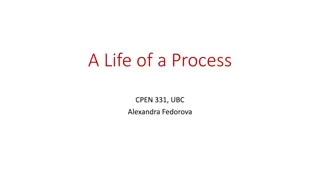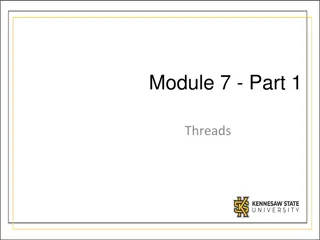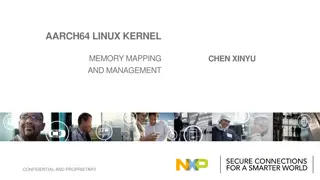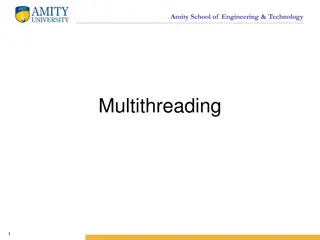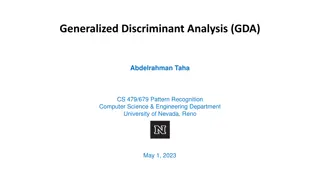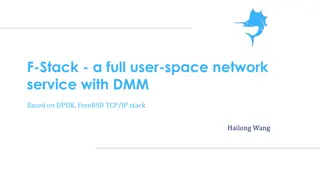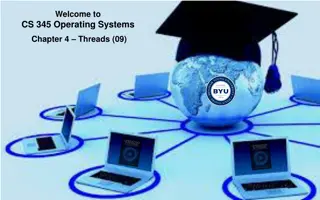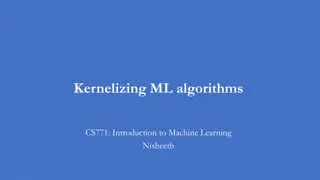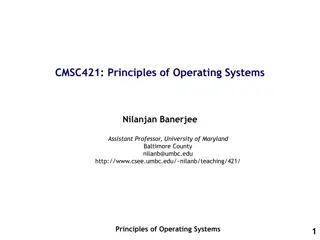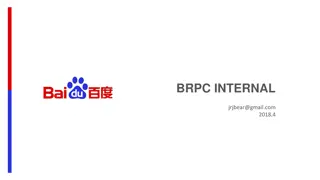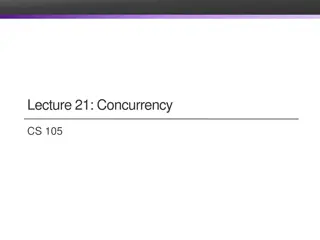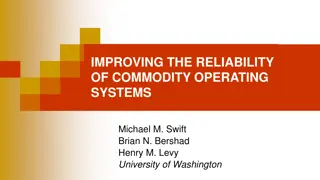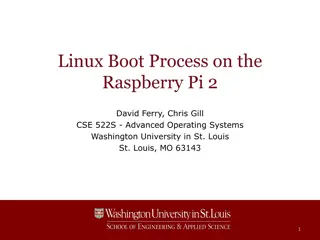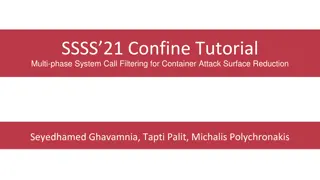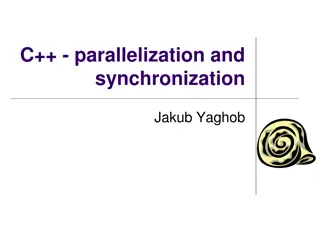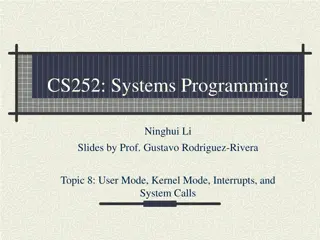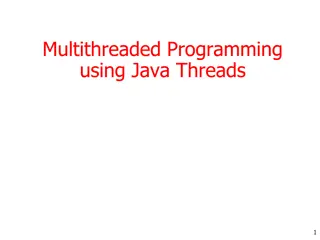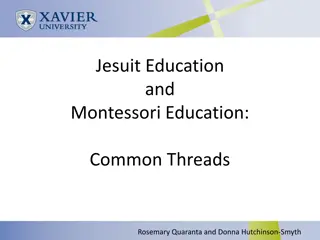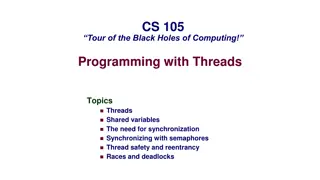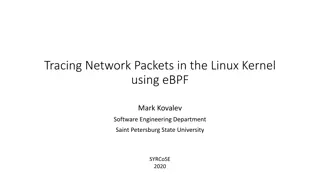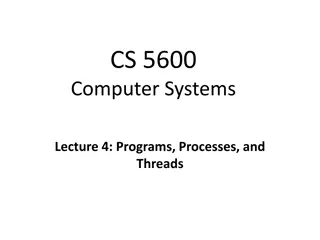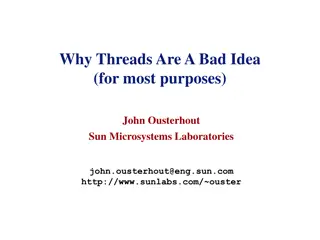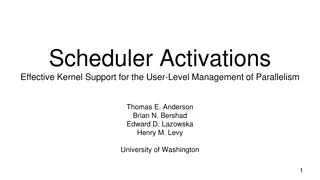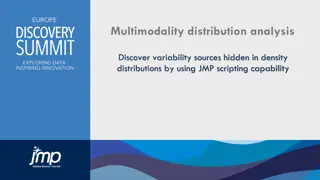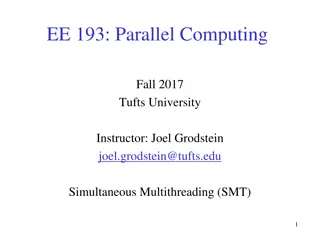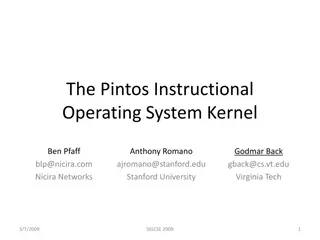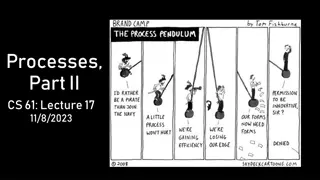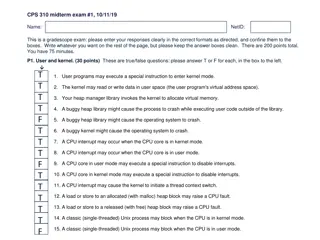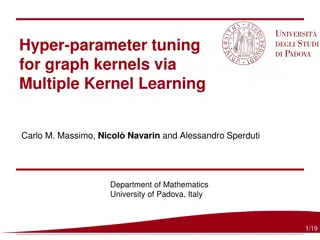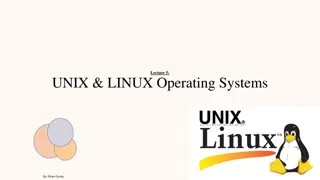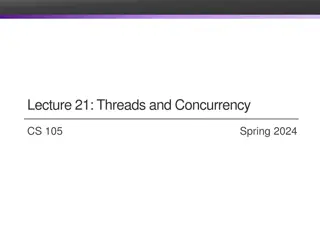Threads is a new app by Instagram that lets people share photos, videos, and messages with just their close friends
Threads is a new app by Instagram that lets people share photos, videos, and messages with just their close friends. This makes it different from the regular Instagram app, which is more public-facing. Because Threads is all about close connections, it can be a great tool for marketers to connect wi
6 views • 7 slides
A Life of a Process
This content delves into the creation and management of processes in operating systems, covering concepts such as forking processes, process states, address space management, copying processes, and key functions involved in process handling. It provides insights on constructing processes from scratc
0 views • 35 slides
Understanding Threads in Computing
Exploring the concepts of parallel, distributed, and concurrent computing processes and how threads, cores, and CPUs work together. Delve into the terminology, implementation in Java and C#, synchronization, and the importance of leveraging multiple cores for enhanced performance.
0 views • 24 slides
Understanding Threads, Linked Lists, and Programming Models in Concurrent Programs
Delve into the concepts of threads, linked lists, and programming models in concurrent programs. Explore the use of threads for handling multiple requests, the struct types in programming, and the various access methods for lists. Learn about the benefits of threads and how they enable parallel proc
0 views • 44 slides
Understanding AARCH64 Linux Kernel Memory Management
Explore the confidential and proprietary details of AARCH64 Linux kernel memory mapping, virtual memory layout, variable configurations, DDR memory layout, and memory allocation techniques. Get insights into the allocation of physically contiguous memory using Continuous Memory Allocator (CMA) integ
0 views • 18 slides
Understanding Multithreading and Multiprocessing in Amity School of Engineering & Technology
Explore the concepts of multithreading and multiprocessing at Amity School of Engineering & Technology. Learn about the types of multiprocessing, threads, thread life cycle, advantages of multithreading, and the importance of user and daemon threads in Java programming. Dive into the world of utiliz
0 views • 96 slides
Understanding Generalized Discriminant Analysis (GDA) in Pattern Recognition
Generalized Discriminant Analysis (GDA) is a nonlinear form of Linear Discriminant Analysis (LDA) that utilizes kernel methods to find discriminatory features for optimal class separability. LDA aims to maximize the between-class covariance matrix while minimizing the within-class covariance matrix.
2 views • 17 slides
Optimizing User-Space Network Services with F-Stack and FreeBSD TCP/IP Stack
F-Stack, a user-space network service using DPDK and FreeBSD TCP/IP stack, addresses challenges in handling service traffic like CDN and live streaming. By leveraging 25GbE, 40GbE, and 100GbE NICs, coupled with multi-core CPUs and kernel bypass techniques, F-Stack overcomes bottlenecks between user
1 views • 17 slides
Understanding Threads and Task Scheduling in Operating Systems
Threads and task scheduling play a crucial role in modern operating systems. This chapter delves into the concept of threads, including standard integer typedefs and the importance of multitasking. It explores the implementation of a five-state task scheduler capable of executing multiple tasks effi
0 views • 25 slides
Understanding Kernel Tricks in Machine Learning
Kernel tricks in machine learning involve transforming inputs into higher-dimensional spaces to make linear models work for nonlinear data. Kernels can be applied to various algorithms like SVM, ridge regression, and more, allowing for better model performance with complex datasets.
0 views • 15 slides
Fundamentals of Operating Systems Explained
Explore the core concepts of operating systems, including kernel-userspace interactions, system calls, context switching, and virtual memory management. Delve into x86 assembly for system calls, hardware interrupts, and the flow of control during system call invocations. Gain insights into key compo
7 views • 19 slides
Understanding BRPC Threading and Context Management
Delve into the intricate details of BRPC's threading model, including the comparison between user threads and kernel threads, the M:N model using bthreads, context switches with boost
0 views • 39 slides
Understanding Concurrency in Computer Science
Concurrency in computer science involves running multiple threads or processes simultaneously, providing responsiveness, managing I/O devices, and improving performance by utilizing multiprocessors. This concept allows programs to handle tasks more efficiently and effectively through parallel execut
0 views • 32 slides
Understanding the Non-Blocking Michael Scott Queue
The Non-Blocking Michael Scott Queue, presented by Gurudatta Patil, is a thread-based data structure where threads help each other in managing a queue efficiently. Threads collaborate to add nodes at the tail and remove them from the head, ensuring smooth operation even in a non-empty queue scenario
0 views • 17 slides
Improving the Reliability of Commodity Operating Systems
This research paper discusses the challenges and solutions in enhancing the reliability of commodity operating systems by addressing system failures caused by kernel extensions. The Nooks approach isolates extensions within protection domains, allowing them to reside in the kernel address space with
0 views • 40 slides
Raspberry Pi 2 Boot Process Overview
Raspberry Pi 2's boot process involves a series of stages initiated by the GPU, loading essential firmware and enabling hardware components gradually, leading to the activation of the CPU and the kernel's entry point. The system transitions through various low-level processes before reaching a stabl
0 views • 9 slides
Multi-phase System Call Filtering for Container Security Enhancement
This tutorial discusses the importance of multi-phase system call filtering for reducing the attack surface of containers. It covers the benefits of containerization, OS virtualization, and the differences between OS and hardware virtualization. The tutorial emphasizes the need to reduce the kernel
0 views • 32 slides
Understanding C++ Parallelization and Synchronization Techniques
Explore the challenges of race conditions in parallel programming, learn how to handle shared states in separate threads, and discover advanced synchronization methods in C++. Delve into features from C++11 to C++20, including atomic operations, synchronization primitives, and coordination types. Un
0 views • 48 slides
Understanding User Mode, Kernel Mode, Interrupts, and System Calls in Computer Architecture
In modern computers following Von Newman Architecture, programs and data are stored in RAM. The CPU, RAM, ROM, and devices communicate via address and data buses. The system operates in both kernel and user modes, where kernel mode allows full system control, while user mode restricts access for sec
0 views • 29 slides
Guide to Multithreaded Programming using Java Threads
Explore the world of multithreaded programming with Java threads, covering topics such as defining threads, thread applications, priorities, accessing shared resources, synchronization, and advanced concurrency models. Delve into the differences between multithreading and multiprocessing, and learn
0 views • 46 slides
Common Threads Between Jesuit Education and Montessori Education
There are common threads between Jesuit Education and Montessori Education, emphasizing nurturing the whole person, fostering respect and responsibility, and instilling a sense of wonder and gratitude. Both educational approaches aim to develop students as leaders in service, promoting holistic deve
0 views • 11 slides
Understanding Multithreading in Computing
Exploring the realms of multithreading in computing delves into topics like shared variables, synchronization with semaphores, thread safety, reentrancy, races, and deadlocks. The content illustrates the differences between the traditional and alternate views of a process, the structure of a process
0 views • 44 slides
Parallel Programming Directives and Concepts
Learn about parallel programming directives like Diretiva.parallel and #pragma omp.parallel, which allow code to be executed by multiple threads simultaneously. Explore concepts such as defining parallel regions, setting the number of threads, and utilizing OpenMP directives for parallel for loops.
0 views • 39 slides
Tracing Network Packets in Linux Kernel with eBPF
This presentation discusses the challenges of troubleshooting modern networking systems and proposes a solution using eBPF technology to trace the path of network packets in the Linux kernel. The goal is to develop a tool that provides detailed information about how network packets are processed in
0 views • 16 slides
Understanding Threads and Concurrency in Systems Programming
Delve into the world of threads, exploring their concepts, schedulers, memory access speeds, and lightweight vs. heavyweight distinctions. Discover how NUMA machines enhance parallelism, the role of threads in Linux kernel management, and examples like word count applications. Gain insights into man
0 views • 55 slides
Understanding Programs, Processes, and Threads in Computer Systems
In this comprehensive guide, we delve into the fundamental concepts of programs, processes, and threads in computer systems. Exploring topics such as dynamic code execution, program formats, and the execution of .exe files, we uncover the intricate workings of how software is executed and managed by
0 views • 110 slides
Why Threads Are a Bad Idea for Most Purposes - John Ousterhout's Perspective
John Ousterhout, from Sun Microsystems Laboratories, argues that threads are difficult to program and manage due to challenges like synchronization, deadlock, and breaking abstraction. He suggests using events over threads for most purposes. Threads should only be used when true CPU concurrency is n
0 views • 15 slides
User-Level Management of Parallelism: Scheduler Activations
This content delves into the comparison between kernel-level threads and user-level threads in managing parallelism. It discusses the challenges and benefits associated with each threading model, highlighting the trade-offs between system overhead, flexibility, and resource utilization. The concept
0 views • 39 slides
Analyzing Multimodality in Density Distributions Using JMP Scripting
Explore variability sources hidden in density distributions through JMP scripting. The analysis focuses on identifying and filtering distribution modes in semiconductor fab electrical measurements using kernel estimation and empirical rules. Antonio D'Angelo and Felice Russo from Lfoundry S.r.l. Ita
0 views • 6 slides
Understanding Remote Procedure Call (RPC) in Different Kernel Environments
Communication through Remote Procedure Call (RPC) plays a crucial role in facilitating seamless interaction between server and client processes, whether on the same machine or across different kernels. This technology streamlines local and cross-domain communication, optimizing performance while ens
0 views • 9 slides
Introduction to Parallel Computing Concepts
Exploring the concepts of threads, pipelining, and dependence in parallel computing. Discussions on why multiple threads are beneficial, pipelined instructions, and the challenges of dependencies in executing instructions sequentially. Delve into Simultaneous Multithreading (SMT) and its advantages
0 views • 9 slides
Overview of the Pintos Instructional Operating System Kernel Project
Description of the Pintos Operating System Kernel project, including its use in educational settings at institutions such as Stanford University and Virginia Tech. The project aims to provide students with a hands-on experience in OS design, focusing on the internal workings of the kernel. Pintos fe
0 views • 33 slides
Understanding Pipes in Process Communication
Pipes in process communication allow for high-throughput data transfer between parent and child processes. The kernel creates a communication stream through file descriptors, enabling one process to send data to another. Processes can use pipes for efficient inter-process communication, with the ker
1 views • 15 slides
Understanding User and Kernel Modes in Operating Systems
The content provided discusses various aspects of user and kernel modes in operating systems through a set of true/false questions related to user programs, CPU interrupts, heap management, and process behavior in different modes. It touches on the role of the kernel in managing virtual memory, hand
0 views • 10 slides
Hyper-Parameter Tuning for Graph Kernels via Multiple Kernel Learning
This research focuses on hyper-parameter tuning for graph kernels using Multiple Kernel Learning, emphasizing the importance of kernel methods in learning on structured data like graphs. It explores techniques applicable to various domains and discusses different graph kernels and their sub-structur
0 views • 20 slides
Overview of UNIX and Linux Operating Systems
The UNIX brand encompasses a range of powerful multitasking, multiuser operating systems used by various organizations to develop IT technologies. UNIX internals consist of kernel space and user space, with programs accessing system services rather than hardware directly. The Unix filesystem is a ke
0 views • 36 slides
Understanding and Avoiding Deadlocks and Livelocks in Concurrent Programming
Deadlocks and livelocks are common issues in multi-threaded programming. Deadlocks occur when two or more threads are waiting for each other to release a resource, leading to a standstill. Livelocks, on the other hand, involve threads that are actively trying to resolve a resource conflict but end u
0 views • 43 slides
Understanding Threads and Concurrency in Programming
Exploring the concepts of threads and concurrency in programming, this content delves into the benefits of concurrent programs, different views of processes, and the distinction between threads and processes. It highlights the significance of managing I/O devices, utilizing multiprocessors for enhan
0 views • 31 slides
Understanding Processes, Threads, and Thread Management
Explore the concepts of processes and threads, distinguish between them, and delve into the implementation of threads at kernel-supported and user-level. Discover the differences in address spaces and thread management tactics for efficient CPU utilization.
0 views • 14 slides
Understanding Context Switching and User-Kernel Interaction in Operating Systems
Context switching in operating systems involves a seamless transition between user-level threads without the kernel's awareness. User-level code manages register state and stack pointers, while user-kernel mode switching requires changing processor privilege levels and agreement on information excha
0 views • 25 slides

